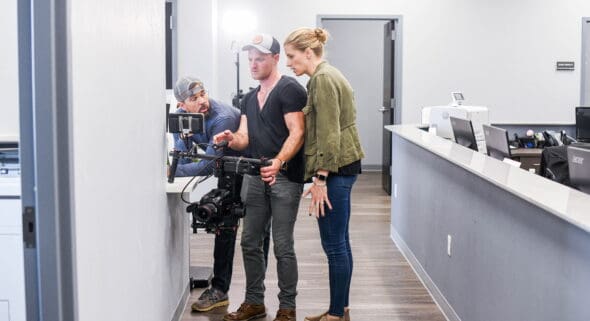10 Political Business Questions Answered by Firm Founders
Over the past year and a half, C&E’s Firm Founders series has highlighted industry entrepreneurs talking about the realities of building a political business from the ground up.

From long-time firm owners to startup founders, our Firm Founders interview subjects have offered a wealth of knowledge about everything from business development to expansion to strengthening client relationships. Here’s some of the best advice we’ve heard:
C&E: The launch period for a firm is always high stakes. What’s your advice on smoothing that early process?
Taryn Rosenkranz, Founder, New Blue Interactive: “The best tip I can give to someone who’s about to start a firm is that before you go out, have two signed contracts … Be far enough along that you know where your first two clients are coming from, because so much of it in the early days is word of mouth and the work product that you do. So if you already have two people invested in you before you even open the door, I think it’s that much easier. In those early days, so much of what I did was getting in front of people and showing them what we could do and being able to have a few people to be your case studies on that is important.”
C&E: What can new firm owners do to make sure they’re getting the business admin side of things right?
Ryan Horn, President, Bullhorn Communications: “I have a mentor and friend in the business world in Omaha who’s a venture capitalist. And so he gave me a great piece of free advice. He said, ‘Don’t be afraid of the things that you’re afraid of.’ When you’re thinking about launching a business so many entrepreneurs are afraid of getting the legal stuff right, getting the bookkeeping right, getting the taxes right, just getting all the back office stuff right. Get a great bookkeeper. Get a really good lawyer. That takes care of two thirds of that backside stuff that seems so intimidating before you’ve started a business. Get good people that you can afford to do the work and invest in them.”
C&E: How important is it to have a founding vision for your firm when you first launch?
Josh Nanberg, Founder, Ampersand Strategies: “It is important to have that vision to have a clear sense of what the firm is, who we work for, what kind of work we do, but what clients we will and won’t work for — that sort of thing. It matters because the team has to know what we’re doing together. They have to know what our direction is. They have to know what our values are. And if I had never taken the time to think about that, I think we’d just be rudderless and grabbing at whatever we can get.”
C&E: What’s the biggest mistake you’ve seen people make when it comes to conceptualizing their business?
Sue Zoldak, Founder of The Zoldak Agency + Zoldak Research + Zoldak Victory: “I think the first and foremost rule of starting any business is to make sure you’re delivering a product that people actually want. I do talk to a lot of people who want to start a business — a consulting business or a product business — and they’re describing something that I think is shoehorned; something that I’m not positive people want to pay for. So are you actually solving a problem that needs to be [solved] or are you trying the reverse of that: trying to start a business because you feel like that’s your skill set? So you’re then trying to sell your unique skill set. Those are actually two completely different things, and a lot of people confuse those two things. Just because you have a skill set doesn’t mean that you start a business around it.”
C&E: What’s your approach to building business and developing client relationships?
Francesca Dulce Larson, Partner, Mosaic Strategies Group: “I think for us, it was not about the wins and losses of candidates, but about the relationships. So how do you make sure that you get rehired by somebody? A candidate who loses may run for office again, or they may start a nonprofit, or they may lead a PAC. And what we realized was that some of our candidates who failed the first time went on to become some of our biggest successes and some of our best relationships … As you’re starting to think about your model, find folks who you enjoy working with. If you don’t like a candidate, don’t work with them. When you’re finding folks you actually enjoy working with, they’re going to start referring you to other people that you enjoy working with. And that allows this to be a sustainable model, not just financially, but also emotionally and for your family.”
C&E: Marketing yourself is so important for new firm owners. What’s your advice on getting that right?
Sharon Paez, Founder, Potomac Waves Media: “What are you selling? What’s your product? What do you do? Make sure that your network knows about you and what you’re doing. Also, when you go after business, go after the bigger committees and initiatives that you know issue RFPs. You know that a year out they’re going to be looking for vendors, whether you’re doing media or phones or texting or mail. Have an informational meeting. You want to introduce yourself to their committee — you want to be on the list when the RFP is issued. And you just respond to every RFP that you get.”
C&E: What’s your advice for founders who may not have a lot of work product to show potential clients when they first launch?
Kara Turrentine, Founder, Turrency Political + Co-Founder, BlackBrown Partners: “I wanted to build a portfolio before actually launching full time. So I took as many projects as my arms and hands would let me take to build a portfolio that would let us go out there and pitch some of the bigger stuff … I think it’s really important in the early stages that you have work product to show. In the early, early days, we did some of that advocacy work with nonprofits and small businesses that were in town — any opportunity that we had to show our design prowess. We did the Women’s March pro bono because it was such a huge event and it gave us a really critical moment in history to participate in, while also showcasing our ability to do massive events. So we built a portfolio of candidates, of causes, and we were able to go out and pitch that to bigger and bigger candidates. So for us in a year’s time, we went from doing city council races to Bernie Sanders.”
C&E: What’s your advice for firm owners who are thinking about expanding services or staff?
Nicole Schlinger, President & Founder, CampaignHQ: “Sometimes as a business owner, you are so mired in the day to day, it’s not always apparent. And so what I would say to someone is you may not know when it’s time to make that move, but if someone comes to you with that kind of information, it’s important to see outside perspectives. It’s important to listen to other people. You may take their advice or you may not. But but you’re not going to get enough perspective from where you are. Your horizon and focus isn’t always going to be at that 50,000 foot level.”
C&E: How did you approach business development when you first started out?
Brent Buchanan, Founder, Cygnal: “Hustle. I still, to this day, do at least an hour a day of outbound business development activities. In a given week, I do 50 to 70 outbound touches, emails, texts, and phone calls. I’ve never let off the gas because I believe deeply in what we do and how it is superior to anything else that exists out there and that if campaigns are going to win, it starts with having the right information and making decisions off reliable data. And so if you take that hustle and combine it with your passion, that’s the key. The other thing would be, fake it till you make it. I had a whole lot of unfounded confidence when I got started because I knew what I was going to build and what I was capable of, but I didn’t necessarily have a whole lot of projects under my belt to prove that.”
C&E: If you could go back and do one thing differently from the start as a firm owner, what change would you make?
Kendall Scudder, Co-Founder, Armadilla Strategies: “I think when we started it was this idea that we were just all in and we would come in and do whatever was needed. But not having that wheelhouse proved to be pretty challenging because for every service you offer, you suddenly have to have different contracts and different billing. You have to have different protocol and different templates and different formats. It became a lot to juggle. It also became difficult to make sure that we were mastering everything we were doing. Pretty quickly into it we realized that we needed to find a lane and we needed to get at it. And once we did that, things became much easier to juggle. It felt like we had ground beneath us instead of us just constantly flying around like a chicken with our head cut off. So that’s probably what I would do in a time machine is get in and say, ‘You know what? We’re going to be a digital firm.’”

